September 27, 2014
by Carole Zangari -
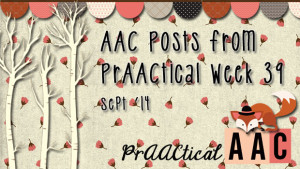
Sunday: Video of the Week: Mentoring AAC Learners Monday: Strategy of the Month: How Clear Priorities and A Little Sacrifice Build Engagement Tuesday: Emergent Literacy Work in AAC Therapy Sessions Wednesday: PrAACtically Pinterest Thursday: Make It PrAACtical – DIY Customizable Stylus Friday: PrAACtical Resources: Making Communication Work
Filed under: PrAACtical Thinking
September 26, 2014
by Carole Zangari -
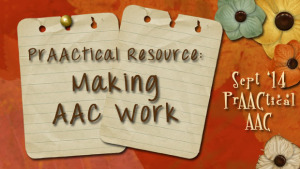
This resource from AAC Scotland has lots of great tips and strategies for helping to make communication exchanges with people who use AAC more successful. We love that many of them are straight from people who communicate with AAC. It is very interactive so make sure to click and explore. You can also download a pamphlet explaining AAC here.
Filed under: PrAACtical Thinking
Tagged With: AAC Scotland, interaction, partners, resources
September 25, 2014
by Carole Zangari -
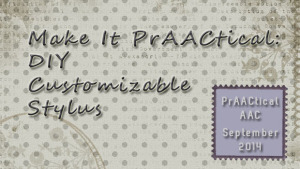
Lost your stylus? Have a kid who’s really tough on them? Need to customize one for a client with motor concerns? Theresa Willkomm and the team at the New Hamphire AT project has a great video that gives us a few different options.
Filed under: PrAACtical Thinking
Tagged With: assistive technology, AT, DIY, stylus, Theresa Willkomm
September 23, 2014
by Carole Zangari -
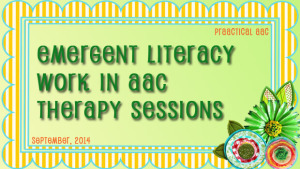
We strive to use some of our therapy time to build the literacy skills with all of our beginning communicators. It’s not easy. First, because they often have little to no interest in it (at first), but mostly because our time together is quite limited. Here are some of the things we’ve been doing. Having our clients sign in themselves (Think: name stamps, stickers, tracing, or even making a mark) Looking for their name on their therapy room door: We make signs and print two copies. We give them one in the waiting room so that they can match it to the sample on the door. Formatting the visual schedule so that the client does some writing (Think: check box, crossing off the activity when finished) Picking a book or the topic: For some of clients we use the books themselves, but for most we use their AAC. It’s time... [Read More...]
Filed under: PrAACtical Thinking
Tagged With: beginning communicator, Books, emergent literacy, writing
September 20, 2014
by Carole Zangari -
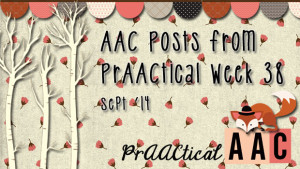
Sunday: Video of the Week – Using an Alphabet Flipbook for Writing Monday: Strategy of the Month – Understanding Our Learners Tuesday: Teach Me Tuesday – Scene and Heard Wednesday: Watch It Wednesday – ABC’s of Independence Thursday: AACtual Therapy – Building Language and Emergent Literacy Skills with ‘Do You Wear Diapers?’ Friday: Fast Fact Friday – School-based SLPs and Students with AAC Needs
Filed under: PrAACtical Thinking
September 19, 2014
by Carole Zangari -
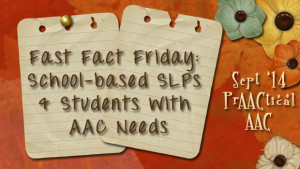
If you’re up for a little light reading this weekend, you might want to check out ASHA’s 2014 SLP Schools Survey Caseload Report. Among the findings: 55% of school-based SLPs regularly serve students with AAC needs 90% of them serve kids with ASD. The largest median caseload (60) was in Florida, and the smallest (35) was in New York. ::::::::::::::::::::::::::::::::::::::::::::::::::::::::::::::::::::::::::::::::::::::::::::::::::::: Reference American Speech-Language-Hearing Association. (2014). 2014 Schools Survey report: SLP caseload characteristics. Available from www.asha.org/research/memberdata/schoolssurvey/.
Filed under: PrAACtical Thinking
Tagged With: ASHA, caseload, schools
September 18, 2014
by Carole Zangari -
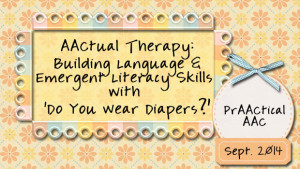
What’s more fun than using story books to teaching language to young children with AAC needs? Today, we hear from Kimberly Scanlon, an SLP practicing in New Jersey. Kimberley is is a devoted mom, wife and dog lover and blogs at Scanlon Speech and My Toddler Talks. She is the author of My Toddler Talks: Strategies and Activities to Promote Your Child’s Language Development and is finishing a unique picture and activity workbook, Learning to Read is a Ball. ::::::::::::::::::::::::::::::::::::::::::::::::::::::::::: Hold on to your undies, today we’re going to talk about poop, diapers, and the location of where various animals go potty. Sounds like a good time, right? Kidding aside, in this post I’m going to show you how to use this adorable picture book, Do You Wear Diapers? by Tanya Roitman to facilitate language and emergent literacy development in toddlers and preschoolers. What’s this book about? It’s a potty book! This adorable board book... [Read More...]
Filed under: PrAACtical Thinking
Tagged With: Books, emergent literacy, Kimberly Scanlon, potty, preschoolers, reading
September 17, 2014
by Carole Zangari -
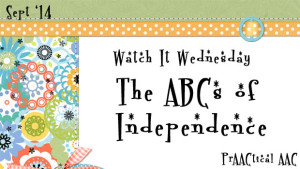
We were looking for an adult-oriented alphabet materials the other day and came across this gem. Thanks, Beth Moulam!
Filed under: PrAACtical Thinking
Tagged With: Beth Moulam, independence
September 16, 2014
by Carole Zangari -
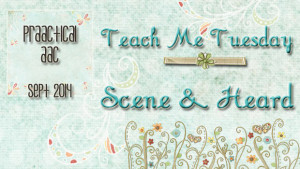
Today, we’re learning about Scene and Heard by TBox Apps. User Guide Introductory Video by TBox Download Other Scenes Adding Videos to Scenes Creating an Index of Scenes Recorded Webinars on Predictable Where To Go for Help: info@tboxapps.com
Filed under: PrAACtical Thinking
Tagged With: AAC app, Scene and Heard, Teach Me Tuesday
September 13, 2014
by Carole Zangari -
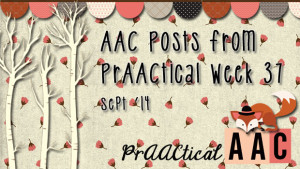
Sunday: Video of the Week – AAC in the Group Home Monday: Strategy of the Month: Engaging the Learner Tuesday: Research Tuesday: Photos Versus PCS – Babies Weigh In Wednesday: Five Facebook Groups for Families of Beginning Communicators Thursday: 5 Things We’ve Learned from our AAC Families Friday: Fun Friday: Check Your Knowledge of AT History
Filed under: PrAACtical Thinking









